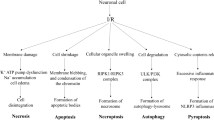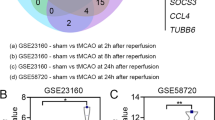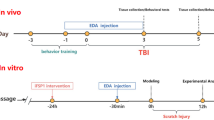Abstract
Melatonin has a role in the cell survival signaling pathways as a candidate for secondary stroke prevention. Therefore, in the present study, the coordination of ipsilateral and contralateral hemispheres to evaluate delayed post-acute effect of melatonin was examined on recovery of the cell survival and apoptosis after stroke. Melatonin was administered (4 mg/kg/day) intraperitoneally for 45 days, starting 3 days after 30 min of middle cerebral artery occlusion. The genes and proteins related to the cell survival and apoptosis were investigated by immunofluorescence, western blotting, and RT-PCR techniques after behavioral experiments. Melatonin produced delayed neurological recovery by improving motor coordination on grip strength and rotarod tests. This neurological recovery was also reflected by high level of NeuN positive cells and low level of TUNEL-positive cells suggesting enhanced neuronal survival and reduced apoptosis at the fifty-fifth day of stroke. The increase of NGF, Nrp1, c-jun; activation of AKT; and dephosphorylation of ERK and JNK at the fifty-fifth day showed that cell survival and apoptosis signaling molecules compete to contribute to the remodeling of brain. Furthermore, an increase in the CREB and Atf-1 expressions suggested the melatonin’s strong reformative effect on neuronal regeneration. The contralateral hemisphere was more active at the latter stages of the molecular and functional regeneration which provides a further proof of principle about melatonin’s action on the promotion of brain plasticity and recovery after stroke.
Graphical abstract









Similar content being viewed by others
References
Alessandrini A, Namura S, Moskowitz MA, Bonventre JV (1999) MEK1 protein kinase inhibition protects against damage resulting from focal cerebral ischemia. Proc Natl Acad Sci USA 96:12866–12869. https://doi.org/10.1073/pnas.96.22.12866
Ali T, Kim MO (2005) Melatonin ameliorates amyloid beta-induced memory deficits, tau hyperphosphorylation and neurodegeneration via PI3/Akt/GSk3beta pathway in the mouse hippocampus. J Pineal Res 59:47–59. https://doi.org/10.1111/jpi.12238
Alonso-Alconada D, Alvarez A, Arteaga O, Martínez-Ibargüen A, Hilario E (2013) Neuroprotective effect of melatonin: a novel therapy against perinatal hypoxia-ischemia. Int J Mol Sci 14:9379–9395. https://doi.org/10.3390/ijms14059379
Andrabi SA, Sayeed I, Siemen D, Wolf G, Horn TF (2004) Direct inhibition of the mitochondrial permeability transition pore: a possible mechanism responsible for anti-apoptotic effects of melatonin. FASEB J 18(7):869–871. https://doi.org/10.1096/fj.03-1031fje
Bacigaluppi M, Pluchino S, Peruzzotti-Jametti L, Kilic E, Kilic U, Salani G, Brambilla E, West MJ, Comi G, Martino G, Hermann DM (2009) Delayed post-ischaemic neuroprotection following systemic neural stem cell transplantation involves multiple mechanisms. Brain 132(Pt 8):2239–2251. https://doi.org/10.1093/brain/awp174
Bake S, Okoreeh AK, Alaniz RC, Sohrabji F (2016) Insulin-like growth factor (IGF)-I modulates endothelial blood-brain barrier function in ischemic middle-aged female rats. Endocrinol 157:61–69. https://doi.org/10.1210/en.2015-1840
Beker MC, Caglayan AB, Kelestemur T, Caglayan B, Yalcin E, Yulug B, Kilic U, Hermann DM, Kilic E (2015) Effects of normobaric oxygen and melatonin on reperfusion injury: role of cerebral microcirculation. Oncotarget 6(31):30604–30614. https://doi.org/10.18632/oncotarget.5773.
Borsello T, Clarke PG, Hirt L, Vercelli A, Repici M, Schorderet DF, Bogousslavsky J, Bonny C (2003) A peptide inhibitor of c-Jun N-terminal kinase protects against excitotoxicity and cerebral ischemia. Nat Med 9:1180–1186. https://doi.org/10.1038/nm911
Cariboni A, Davidson K, Dozio E, Memi F, Schwarz Q, Stossi F, Parnavelas JG, Ruhrberg C (2011) VEGF signalling controls GnRH neuron survival via NRP1 independently of KDR and blood vessels. Development 138:3723–3733. https://doi.org/10.1242/dev.063362
Cazzola R, Rondanelli M, Faliva M, Cestaro B (2012) Effects of DHA-phospholipids, melatonin and tryptophan supplementation on erythrocyte membrane physico-chemical properties in elderly patients suffering from mild cognitive impairment. Exp Gerontol 47:974–978. https://doi.org/10.1016/j.exger.2012.09.004
De Winter F, Holtmaat AJ, Verhaagen J (2002) Neuropilin and class 3 semaphorins in nervous system regeneration. Adv Exp Med Biol 515:115–139. https://doi.org/10.1007/978-1-4615-0119-0_10
el-Deiry WS, Tokino T, Velculescu VE, Levy DB, Parsons R, Trent JM, Lin D, Mercer WE, Kinzler KW, Vogelstein B, (1993) WAF1, a potential mediator of p53 tumor suppression. Cell 75:817–825. https://doi.org/10.1016/0092-8674(93)90500-p
Farrokhnia N, Roos MW, Terént A, Lennmyr F (2005) Differential early mitogen-activated protein kinase activation in hyperglycemic ischemic brain injury in the rat. Eur J Clin Invest 35:457–463. https://doi.org/10.1111/j.1365-2362.2005.01512.x
Festing MF, Altman DG (2002) Guidelines for the design and statistical analysis of experiments using laboratory animals. ILAR J 43(4):244–258. https://doi.org/10.1093/ilar.43.4.244
Fujita H, Zhang B, Sato K, Tanaka J, Sakanaka M (2001) Expressions of neuropilin-1, neuropilin-2 and semaphorin 3A mRNA in the rat brain after middle cerebral artery occlusion. Brain Res 914:1–14. https://doi.org/10.1016/s0006-8993(01)02765-2
García JJ, López-Pingarrón L, Almeida-Souza P, Tres A, Escudero P, García-Gil FA, Tan DX, Reiter RJ, Ramírez JM, Bernal-Pérez M (2014) Protective effects of melatonin in reducing oxidative stress and in preserving the fluidity of biological membranes: a review. J Pineal Res 56(3):225–237. https://doi.org/10.1111/jpi.12128
Gartel AL, Radhakrishnan SK (2005) Lost in transcription: p21 repression, mechanisms, and consequences. Cancer Res 65:3980–3985. https://doi.org/10.1158/0008-5472.CAN-04-3995
Gervais JL, Seth P, Zhang H (1998) Cleavage of CDK inhibitor p21(Cip1/Waf1) by caspases is an early event during DNA damage-induced apoptosis. J Biol Chem 273:19207–19212. https://doi.org/10.1074/jbc.273.30.19207
Gitto E, Aversa S, Salpietro CD, Barberi I, Arrigo T, Trimarchi G, Reiter RJ, Pellegrino S (2012) Pain in neonatal intensive care: role of melatonin as an analgesic antioxidant. J Pineal Res 52(3):291–295. https://doi.org/10.1111/j.1600-079X.2011.00941.x
Gu J, Tamura M, Yamada KM (1998) Tumor suppressor PTEN inhibits integrin- and growth factor-mediated mitogen-activated protein (MAP) kinase signaling pathways. J Cell Biol 143:1375–1383. https://doi.org/10.1083/jcb.143.5.1375
Han BH, Holtzman DM (2000) BDNF protects the neonatal brain from hypoxic-ischemic injury in vivo via the ERK pathway. J Neurosci 20:5775–5781. https://doi.org/10.1523/JNEUROSCI.20-15-05775.2000
He P, Ouyang X, Zhou S, Yin W, Tang C, Laudon M, Tian S (2013) A novel melatonin agonist Neu-P11 facilitates memory performance and improves cognitive impairment in a rat model of Alzheimer’ disease. Horm Behav 64:1–7. https://doi.org/10.1016/j.yhbeh.2013.04.009
Hermann DM, Kilic E, Hata R, Hossmann KA, Mies G (2001) Relationship between metabolic dysfunctions, gene responses and delayed cell death after mild focal cerebral ischemia in mice. Neuroscience 104:947–955. https://doi.org/10.1016/s0306-4522(01)00125-7
Hung MW, Tipoe GL, Poon AM, Reiter RJ, Fung ML (2008) Protective effect of melatonin against hippocampal injury of rats with intermittent hypoxia. J Pineal Res 44(2):214–221. https://doi.org/10.1111/j.1600-079X.2007.00514.x
Irving EA, Bamford M (2002) Role of mitogen- and stress-activated kinases in ischemic injury. J Cereb Blood Flow Metab 22:631–647. https://doi.org/10.1097/00004647-200206000-00001
Kilic E, Ozdemir YG, Bolay H, Kelestimur H, Dalkara T (1999) Pinealectomy aggravates and melatonin administration attenuates brain damage in focal ischemia. J Cereb Blood Flow Metab 19:511–516. https://doi.org/10.1097/00004647-199905000-00005
Kilic E, Hermann DM, Kügler S, Kilic U, Holzmüller H, Schmeer C, Bähr M (2002) Adenovirus-mediated Bcl-X(L) expression using a neuron-specific synapsin-1 promoter protects against disseminated neuronal injury and brain infarction following focal cerebral ischemia in mice. Neurobiol Dis 11:275–284. https://doi.org/10.1006/nbdi.2002.0552
Kilic E, Kilic U, Yulug B, Hermann DM, Reiter RJ (2004) Melatonin reduces disseminate neuronal death after mild focal ischemia in mice via inhibition of caspase-3 and is suitable as an add-on treatment to tissue-plasminogen activator. J Pineal Res 36:171–176. https://doi.org/10.1046/j.1600-079x.2003.00115.x
Kilic E, Kilic U, Reiter RJ, Bassetti CL, Hermann DM (2005a) Tissue-plasminogen activator-induced ischemic brain injury is reversed by melatonin: role of iNOS and Akt. J Pineal Res 39:151–155. https://doi.org/10.1111/j.1600-079X.2004.00178.x
Kilic E, Kilic U, Soliz J, Bassetti CL, Gassmann M, Hermann DM (2005b) Brain-derived erythropoietin protects from focal cerebral ischemia by dual activation of ERK-1/-2 and Akt pathways. FASEB J 19(14):2026–2028. https://doi.org/10.1096/fj.05-3941fje
Kilic E, Kilic U, Wang Y, Bassetti CL, Marti HH, Hermann DM (2006) The phosphatidylinositol-3 kinase/Akt pathway mediates VEGF’s neuroprotective activity and induces blood brain barrier permeability after focal cerebral ischemia. FASEB J 20(8):1185–1187. https://doi.org/10.1096/fj.05-4829fje
Kilic E, Kilic U, Bacigaluppi M, Guo Z, Abdallah NB, Wolfer DP, Reiter RJ, Hermann DM, Bassetti CL (2008) Delayed melatonin administration promotes neuronal survival, neurogenesis and motor recovery, and attenuates hyperactivity and anxiety after mild focal cerebral ischemia in mice. J Pineal Res 45(2):142–148. https://doi.org/10.1111/j.1600-079X.2008.00568.x
Kilic E, ElAli A, Kilic U, Guo Z, Ugur M, Uslu U, Bassetti CL, Schwab ME, Hermann DM (2010) Role of Nogo-A in neuronal survival in the reperfused ischemic brain. J Cereb Blood Flow Metab 30(5):969–984. https://doi.org/10.1038/jcbfm.2009.268
Kilic U, Yilmaz B, Ugur M, Yüksel A, Reiter RJ, Hermann DM, Kilic E (2012) Evidence that membrane-bound G protein-coupled melatonin receptors MT1 and MT2 are not involved in the neuroprotective effects of melatonin in focal cerebral ischemia. J Pineal Res 52(2):228–235. https://doi.org/10.1111/j.1600-079X.2011.00932.x
Kilic U, Yilmaz B, Reiter RJ, Yüksel A, Kilic E (2013) Effects of memantine and melatonin on signal transduction pathways vascular leakage and brain injury after focal cerebral ischemia in mice. Neuroscience 237:268–276. https://doi.org/10.1016/j.neuroscience.2013.01.059
Koc S, Cayli S, Aksakal C, Ocakli S, Soyalic H, Somuk BT, Yüce S (2016) Protective effects of melatonin and selenium against apoptosis of olfactory sensory neurons: a rat model study. Am J Rhinol Allergy 30(3):62–66. https://doi.org/10.2500/ajra.2016.30.4313
Koh PO (2008) Melatonin attenuates the cerebral ischemic injury via the MEK/ERK/p90RSK/Bad signaling cascade. J Vet Med Sci 70:1219–1223. https://doi.org/10.1292/jvms.70.1219
Kong PJ, Byun JS, Lim SY, Lee JJ, Hong SJ, Kwon KJ, Kim SS (2008) Melatonin induces Akt phosphorylation through melatonin receptor- and PI3K-dependent pathways in primary astrocytes. Korean J Physiol Pharmacol 12(2):37–41. https://doi.org/10.4196/kjpp.2008.12.2.37
Letechipía-Vallejo G, González-Burgos I, Cervantes M (2001) Neuroprotective effect of melatonin on brain damage induced by acute global cerebral ischemia in cats. Arch Med Res 32(3):186–192. https://doi.org/10.1016/s0188-4409(01)00268-5
Lipton SA (2004) Failures and successes of NMDA receptor antagonists: molecular basis for the use of open-channel blockers like memantine in the treatment of acute and chronic neurologic insults. NeuroRx 1:101–110. https://doi.org/10.1602/neurorx.1.1.101
Liu K, Lu Y, Lee JK, Samara R, Willenberg R, Sears-Kraxberger I, Tedeschi A, Park KK, Jin D, Cai B, Xu B, Connolly L, Steward O, Zheng B, He Z (2010) PTEN deletion enhances the regenerative ability of adult corticospinal neurons. Nat Neurosci 13:1075–1081. https://doi.org/10.1038/nn.2603
Martel MA, Soriano FX, Baxter P, Rickman C, Duncan R, Wyllie DJ, Hardingham GE (2009) Inhibiting pro-death NMDA receptor signaling dependent on the NR2 PDZ ligand may not affect synaptic function or synaptic NMDA receptor signaling to gene expression. Channels (austin) 3:12–15. https://doi.org/10.4161/chan.3.1.7864
Mattson MP, Cheng B (1993) Growth factors protect neurons against excitotoxic/ischemic damage by stabilizing calcium homeostasis. Stroke 24(12 Suppl):I136–40; discussion I144–5
Mauriz JL, Collado PS, Veneroso C, Reiter RJ, González-Gallego J (2013) A review of the molecular aspects of melatonin’s anti-inflammatory actions: recent insights and new perspectives. J Pineal Res 54(1):1–14. https://doi.org/10.1111/j.1600-079X.2012.01014.x
Mayo JC, Sainz RM, Uria H, Antolin I, Esteban MM, Rodriguez C (1998) Melatonin prevents apoptosis induced by 6-hydroxydopamine in neuronal cells: implications for Parkinson’s disease. J Pineal Res 24(3):179–192. https://doi.org/10.1111/j.1600-079x.1998.tb00531.x
Mayo JC, Sainz RM, Tan DX, Antolín I, Rodríguez C, Reiter RJ (2005) Melatonin and Parkinson’s disease. Endocrine 27:169–178
Ning K, Pei L, Liao M, Liu B, Zhang Y, Jiang W, Mielke JG, Li L, Chen Y, El-Hayek YH, Fehlings MG, Zhang X, Liu F, Eubanks J, Wan Q (2004) Dual neuroprotective signaling mediated by downregulating two distinct phosphatase activities of PTEN. J Neurosci 24:4052–4060. https://doi.org/10.1523/JNEUROSCI.5449-03.2004
Nito C, Kamada H, Endo H, Niizuma K, Myer DJ, Chan PH (2008) Role of the p38 mitogen-activated protein kinase/cytosolic phospholipase A2 signaling pathway in blood-brain barrier disruption after focal cerebral ischemia and reperfusion. J Cereb Blood Flow Metab 28:1686–1696. https://doi.org/10.1038/jcbfm.2008.60
Oliva AA, Kang YJr, Sanchez-Molano J, Furones C, Atkins CM (2012) STAT3 signaling after traumatic brain injury. J Neurochem 120:710–720. https://doi.org/10.1111/j.1471-4159.2011.07610.x
Pei Z, Fung PC, Cheung RT (2003) Melatonin reduces nitric oxide level during ischemia but not blood-brain barrier breakdown during reperfusion in a rat middle cerebral artery occlusion stroke model. J Pineal Res 34:110–118. https://doi.org/10.1034/j.1600-079x.2003.00014.x
Pei Z, Cheung RT (2004) Pretreatment with melatonin exerts anti-inflammatory effects against ischemia/reperfusion injury in a rat middle cerebral artery occlusion stroke model. J Pineal Res 37:85–91. https://doi.org/10.1111/j.1600-079X.2004.00138.x
Persengiev SP (2001) The neuroprotective and antiapoptotic effects of melatonin in cerebellar neurons involve glucocorticoid receptor and p130 signal pathways. J Steroid Biochem Mol Biol 77(2–3):151–158. https://doi.org/10.1016/s0960-0760(01)00037-1
Piao CS, Kim JB, Han PL, Lee JK (2003) Administration of the p38 MAPK inhibitor SB203580 affords brain protection with a wide therapeutic window against focal ischemic insult. J Neurosci Res 73:537–544. https://doi.org/10.1002/jnr.10671
Reiter RJ (1998) Oxidative damage in the central nervous system: protection by melatonin. Prog Neurobiol 56:359–384. https://doi.org/10.1016/s0301-0082(98)00052-5
Reiter RJ, Tan DX, Manchester LC, Lopez-Burillo S, Sainz RM, Mayo JC (2003) Melatonin: detoxification of oxygen and nitrogen-based toxic reactants. Adv Exp Med Biol 527:539–548. https://doi.org/10.1007/978-1-4615-0135-0_62
Reiter RJ, Tan DX, Leon J, Kilic U, Kilic E (2005) When melatonin gets on your nerves: its beneficial actions in experimental models of stroke. Exp Biol Med (maywood) 230:104–117. https://doi.org/10.1177/153537020523000205
Reitmeir R, Kilic E, Kilic U, Bacigaluppi M, ElAli A, Salani G, Pluchino S, Gassmann M, Hermann DM (2011) Post-acute delivery of erythropoietin induces stroke recovery by promoting perilesional tissue remodelling and contralesional pyramidal tract plasticity. Brain 134:84–99. https://doi.org/10.1093/brain/awq344
Robertson NJ, Lingam I, Meehan C, Martinello KA, Avdic-Belltheus A, Stein L, Tachrount M, Price D, Sokolska M, Bainbridge A, Hristova M, Fleiss B, Kramer BW, Gressens P, Golay X (2020) High-dose melatonin and ethanol excipient combined with therapeutic hypothermia in a newborn piglet asphyxia model. Sci Rep 10(1):3898. https://doi.org/10.1038/s41598-020-60858-x
Rodriguez R, Meuth M (2006) Chk1 and p21 cooperate to prevent apoptosis during DNA replication fork stress. Mol Biol Cell 17:402–412. https://doi.org/10.1091/mbc.e05-07-0594
Rosales-Corral SA, Acuña-Castroviejo D, Coto-Montes A, Boga JA, Manchester LC, Fuentes-Broto L, Korkmaz A, Ma S, Tan DX, Reiter RJ (2012) Alzheimer’s disease: pathological mechanisms and the beneficial role of melatonin. J Pineal Res 52(2):167–202. https://doi.org/10.1111/j.1600-079X.2011.00937.x
Shackelford DA, Yeh RY (2006) Modulation of ERK and JNK activity by transient forebrain ischemia in rats. J Neurosci Res 83:476–488. https://doi.org/10.1002/jnr.20747
Taguchi A, Wen Z, Myojin K, Yoshihara T, Nakagomi T, Nakayama D, Tanaka H, Soma T, Stern DM, Naritomi H, Matsuyama T (2007) Granulocyte colony-stimulating factor has a negative effect on stroke outcome in a murine model. Eur J Neurosci 26:126–133. https://doi.org/10.1111/j.1460-9568.2007.05640.x.
Tai SH, Chen HY, Lee EJ, Chen TY, Lin HW, Hung YC, Huang SY, Chen YH, Lee WT, Wu TS (2010) Melatonin inhibits postischemic matrix metalloproteinase-9 (MMP- 9) activation via dual modulation of plasminogen/plasmin system and endogenous MMP inhibitor in mice subjected to transient focal cerebral ischemia. J Pineal Res 49:332–341. https://doi.org/10.1111/j.1600-079X.2010.00797.x
Tan YX1, Wang DF, Li XM, Liu XM (2007) Effects of nerve growth factor pretreatment on apoptosis of neurons and expression of Bcl-2, Bax protein inbrain tissue following cerebral ischemia/reperfusion injury in gerbils. Zhongguo Wei Zhong Bing Ji Jiu Yi Xue 19(6):358-360
Tanaka K, Tsukahara T, Hashimoto N, Ogata N, Yonekawa Y, Kimura T, Taniguchi T (1994) Effect of nerve growth factor on delayed neuronal death after cerebral ischaemia. Acta Neurochir (wien) 129(1–2):64–71. https://doi.org/10.1016/0967-5868(94)90088-4
Workman P, Aboagye EO, Balkwill F, Balmain A, Bruder G, Chaplin DJ, Double JA, Everitt J, Farningham DA, Glennie MJ, Kelland LR, Robinson V, Stratford IJ, Tozer GM, Watson S, Wedge SR, Eccles SA, Committee of the National Cancer Research Institute (2010) Guidelines for the welfare and use of animals in cancer research. Br J Cancer 102(11):1555–1577. https://doi.org/10.1038/sj.bjc.6605642
Yu L, Liang H, Lu Z, Zhao G, Zhai M, Yang Y, Yang J, Yi D, Chen W, Wang X, Duan W, Jin Z, Yu S (2015) Membrane receptor-dependent Notch1/Hes1 activation by melatonin protects against myocardial ischemia-reperfusion injury: in vivo and in vitro studies. J Pineal Res 59:420–433. https://doi.org/10.1111/jpi.12272
Zhang ZH, Xi GM, Li WC, Ling HY, Qu P, Fang XB (2010) Cyclic-AMP response element binding protein and tau are involved in the neuroprotective mechanisms of nerve growth factor during focal cerebral ischemia/reperfusion in rats. J Clin Neurosci 17(3):353–356. https://doi.org/10.1016/j.jocn.2009.07.086
Zhou J, Du T, Li BM (2015) Crosstalk between MAPK/ERK and PI3K/AKT signal pathways during brain ischemia/reperfusion. ASN Neuro 7:1759091415602463. https://doi.org/10.1177/1759091415602463
Funding
This work was financially supported by the grant from the Turkish Scientific and Technical Council (TUBITAK, Grant number:111S418).
Author information
Authors and Affiliations
Contributions
UK and EK designed all the experiments and ABC and MCB carried out experimental cerebral ischemia model. BE and MB performed western blot and histological analysis. BAT performed quantitative RT-PCR analysis. BE and OU executed data analysis and performed statistical analysis. BY contributed to the work by technical and analytical support. UK and BE participated in preparation of the manuscript. All authors read and approved the final manuscript.
Corresponding author
Ethics declarations
Ethics Approval
Local Ethics Committee for Animal Experiments in Yeditepe University (06/09/2011–206)/
Conflict of Interest
The authors declare no competing interests.
Additional information
Publisher's Note
Springer Nature remains neutral with regard to jurisdictional claims in published maps and institutional affiliations.
Rights and permissions
About this article
Cite this article
Kilic, U., Elibol, B., Caglayan, A.B. et al. Delayed Therapeutic Administration of Melatonin Enhances Neuronal Survival Through AKT and MAPK Signaling Pathways Following Focal Brain Ischemia in Mice. J Mol Neurosci 72, 994–1007 (2022). https://doi.org/10.1007/s12031-022-01995-y
Received:
Accepted:
Published:
Issue Date:
DOI: https://doi.org/10.1007/s12031-022-01995-y




